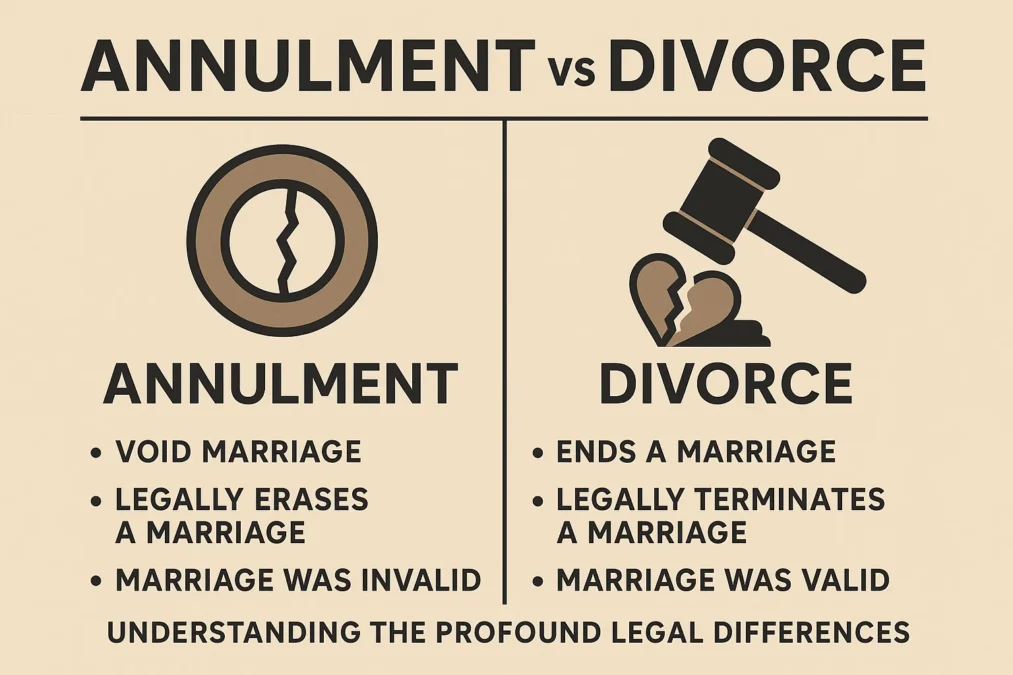When a marriage breaks down, the path forward often seems to lead directly to divorce. It’s the most common, well-understood, and frequently discussed method for legally ending a marriage. But for some people, in a specific set of circumstances, there exists another, far less common legal avenue: an annulment. The choice between an annulment vs divorce isn’t really a choice at all—it’s a determination based on strict legal criteria. While both processes dissolve a marital union, they do so from fundamentally different philosophical and legal starting points. Understanding the stark contrast between them is crucial for anyone considering how to legally untangle themselves from a partnership that is no longer working.
This isn’t just about semantics; it’s about the very definition of your relationship in the eyes of the law. A divorce is the legal termination of a valid marriage. An annulment, however, is a legal decree that states a valid marriage never actually existed in the first place. This core distinction ripples outwards, affecting everything from the grounds for filing and the complexity of the process to the financial outcomes and even personal perceptions. This comprehensive guide will walk you through every aspect of the annulment vs divorce dilemma, providing the clarity you need to navigate this challenging time.
What is a Divorce? A Dissolution of Marriage
A divorce, legally known as “dissolution of marriage,” is the process of formally ending a valid marriage. It operates on the straightforward premise that two people entered into a marriage contract in good faith, but that the relationship has since broken down irretrievably and should be legally terminated. Think of it as untying a knot—the knot was real and properly tied, but you are now undoing it. Divorce is a forward-looking process; it acknowledges the past existence of the marriage and focuses on resolving the practical matters that arise from its ending, such as asset division, spousal support, and child-related issues.
The modern concept of “no-fault” divorce has become the standard in most jurisdictions. This means a spouse does not need to prove any specific wrongdoing, like adultery or abuse, by the other party to obtain a divorce. Instead, they can simply state that the marriage has suffered an “irreconcilable breakdown” or that there are “irreconcilable differences.” This shift has dramatically reduced the acrimony and litigation often associated with divorce proceedings. The primary goal of divorce law is to provide a fair, orderly, and legal framework for separating the lives and assets of two people who were once married.
What is an Annulment? A Declaration of Invalidity
An annulment is a legal procedure that declares a marriage null and void. Unlike a divorce, an annulment treats the marriage as if it never legally existed from the very beginning. The terminology here is key: a marriage is “annulled,” not ended. If a divorce is untying a knot, an annulment is a judicial ruling that the knot was never properly tied in the first place. It is a retroactive erasure of the marital status, effectively wiping the slate clean as if the union never occurred. This is why it’s often referred to as “nullity of marriage.”
Because an annulment nullifies the marriage, the grounds for obtaining one are much more specific and narrow than those for divorce. They typically involve circumstances or conditions that were present at the time of the wedding that made the marriage legally invalid. These are not about what happened during the marriage but about a fundamental flaw in its formation. The law provides annulments not to punish spouses but to offer a remedy in situations where a true, consensual marriage contract could not have been formed due to a critical legal impediment. It is a far less common proceeding and can be significantly more difficult to prove in court.
Key Differences in Grounds and Reasons
The most dramatic difference in the annulment vs divorce comparison lies in the grounds required to file for each. The barriers to entry for each process are worlds apart. For a no-fault divorce, the grounds are broadly accessible and subjective. A simple declaration that the marriage has broken down beyond repair is often sufficient. The court is not particularly interested in assigning blame; its role is to accept that the relationship is over and manage its dissolution.
In stark contrast, the grounds for an annulment are strict, specific, and must be proven with evidence. They are legal “gotchas” that invalidate the marriage contract from its inception. Common grounds for an annulment include fraud (e.g., one person married under a false identity or hid their intention to never have children), bigamy (one person was already legally married to someone else), incest, a marriage where one party was under the legal age of consent without court approval, or a lack of mental capacity due to illness or intoxication at the time of the ceremony. Another critical ground is the inability or unwillingness to consummate the marriage, though this is less commonly used today. The petitioner must provide convincing evidence that one of these specific conditions existed on the day they said “I do.”
The Legal Process and Procedures
The journey through the legal system also looks quite different when comparing an annulment vs divorce. A divorce process, while often emotionally taxing, is a well-trodden path with clear procedures. It involves filing a petition, navigating mandatory waiting or cooling-off periods, engaging in discovery (the exchange of financial and other relevant information), and negotiating a settlement agreement that covers asset division, debts, alimony, and if applicable, child custody and support. If spouses can agree on these terms, the process can be relatively swift and uncontested.
An annulment process, however, is inherently more adversarial and complex because it requires a trial or evidentiary hearing. Since you are asking the court to make a extraordinary declaration—that a marriage never existed—you must prove your case. This involves presenting evidence, calling witnesses, and demonstrating to a judge that the specific grounds for nullity are met. It is much more like a traditional lawsuit than the administrative process a simple, uncontested divorce can be. The burden of proof rests squarely on the person seeking the annulment, and if they fail to meet that burden, the annulment will be denied, and they would have to file for divorce instead.
Financial Implications: Property, Debt, and Spousal Support
The financial outcomes of an annulment vs divorce can be profoundly different, which is a primary reason why people sometimes seek an annulment. In a divorce, the principle of “equitable distribution” or “community property” governs how assets and debts are divided. Courts aim for a fair (though not always equal) split of all marital property—assets and debts acquired during the marriage. Spousal support (alimony) is also a common feature, intended to address economic disparities created by the marriage itself.
Because an annulment decrees that a marriage never legally existed, the concept of “marital property” technically vanishes. There is no “during the marriage” to define assets. Instead, the court will typically try to restore each party to the financial position they were in before the wedding. This is often done through principles of contract law or equity, not family law. This can be messy and unpredictable. A spouse may not be entitled to alimony in an annulment, though some courts can award “rehabilitative support” under certain theories like one partner being a victim of fraud. Retirement accounts and the right to inherit can also be severely impacted. It’s a complex area where the theoretical “clean slate” of an annulment can create practical financial complications.
Impact on Children and Child-Related Issues
A critical area where the annulment vs divorce distinction largely disappears is in matters concerning children. The legal fiction that a marriage never existed cannot apply to the children born from that union. From a legal and biological standpoint, children are a reality that cannot be annulled. Whether their parents’ marriage is dissolved by divorce or annulled, the court’s primary concern regarding the children remains the same: their health, welfare, and best interests.
This means that all standard child-related issues—legal and physical custody, parenting time (visitation), and child support—are handled identically in both an annulment and a divorce. The court will establish orders for child support based on state guidelines and create a parenting plan that serves the child’s needs. A parent cannot use an annulment to avoid their financial or parental responsibilities. The legal status of the children is secure and unaffected by the technicality of whether their parents’ union is declared void or dissolved.
Religious and Personal Considerations
For many individuals, the decision to pursue an annulment vs divorce is not solely a legal one; it is deeply intertwined with religious beliefs and personal values. Several major religions, most notably the Catholic Church, do not recognize civil divorce as dissolving a sacramental marriage. For a devout Catholic, this means that after a civil divorce, they are still considered married in the eyes of their church and cannot remarry within the faith without an ecclesiastical annulment.
It is vital to distinguish between a religious annulment and a legal one. A religious annulment is a separate process governed by church law and has no legal bearing on your marital status with the government. You must obtain a civil divorce or legal annulment to be recognized as single by the law. However, for those of faith, obtaining a religious annulment can provide crucial spiritual closure and the freedom to participate fully in religious life again. The personal peace that comes from having both legal and religious recognition of a marriage’s end is a powerful motivator for many who navigate this dual process.
Choosing the Right Path for Your Situation
So, how do you know which path is right for you in the annulment vs divorce dilemma? The answer is almost always determined by your circumstances. For the vast majority of people ending a marriage, divorce is the only available and appropriate option. If you entered into a legally valid marriage that has simply broken down over time, divorce is the clear and straightforward path to legally end it.
You should only seriously consider investigating an annulment if you believe your marriage suffered from a fundamental, specific legal defect at the very moment it was solemnized. Do you have concrete evidence that your spouse was already married? Did they marry you under a completely false identity or conceal a core fact about themselves that goes to the heart of the marriage contract? If not, attempting to pursue an annulment will likely be a costly, time-consuming, and ultimately unsuccessful endeavor. The best course of action is always to consult with an experienced family law attorney who can evaluate the specific facts of your case and advise you on the correct legal strategy.
Misdemeanor vs Felony: Understanding the Key Differences
Common Misconceptions and Myths
The world of annulment vs divorce is riddled with myths and misunderstandings. One of the most pervasive is the idea that you can get an annulment simply because the marriage was very short. While a short duration might be a byproduct of a reason for annulment (e.g., you discovered your spouse’s fraud a week after the wedding), the brevity of the marriage itself is not grounds for an annulment in any state. A brief marriage is still a valid marriage and must be ended through divorce.
Another common myth is that annulments are cheaper and easier than divorces. Given the evidentiary hearings and legal complexities involved in proving the grounds for an annulment, they are often more expensive and difficult than an uncontested divorce. People also mistakenly believe that an annulment allows them to avoid financial responsibilities like sharing assets or paying support. As discussed, while the rules are different, courts still have mechanisms to ensure a fair financial outcome, and child support obligations are absolutely mandatory. Finally, some think a religious annulment changes their legal status—it does not.
Comparison Table: Annulment vs Divorce at a Glance
| Feature | Divorce | Annulment |
|---|---|---|
| Legal Effect | Terminates a valid marriage. | Declares a marriage null and void (never existed). |
| Grounds | No-fault (e.g., irreconcilable differences). | Specific fault-based grounds existing at time of wedding (e.g., fraud, bigamy). |
| Burden of Proof | Low (only need to state marriage has broken down). | High (must prove specific grounds with evidence). |
| Property Division | Equitable distribution or community property laws apply. | Aim is to restore parties to pre-marriage financial state (can be complex). |
| Spousal Support | Commonly awarded based on need and length of marriage. | Rarely awarded; not typically provided for by statute. |
| Status of Children | Full custody and support orders are established. | Full custody and support orders are established (identical to divorce). |
| Religious Recognition | May not be recognized by some religions. | A religious annulment is often sought for faith-based recognition. |
Quotes on the Matter
“A divorce is for a marriage that died. An annulment is for a marriage that never truly lived.” – Common legal maxim summarizing the philosophical difference.
“The law does not grant annulments for buyer’s remorse. The flaw must be in the foundation of the marriage contract itself, not in the regrets that came after.” – Unnamed Family Court Judge.
Frequently Asked Questions (FAQ)
What is the main difference between an annulment and a divorce?
The main difference is the legal outcome. A divorce legally ends a valid marriage. An annulment is a legal decree that declares the marriage was invalid from the start, meaning it never legally existed. This fundamental distinction affects the grounds, process, and potential financial outcomes of an annulment vs divorce proceeding.
Can I get an annulment if my marriage was only for a few months?
Not based on duration alone. The length of a marriage is not grounds for an annulment. A short marriage is still a legally valid marriage and must be ended through divorce. However, if you discovered a reason for an annulment (like fraud) shortly after the wedding, the short duration is a consequence of that discovery, not the legal reason itself.
How does an annulment affect my financial rights compared to a divorce?
The financial implications of an annulment vs divorce can be significant. In a divorce, you are typically entitled to an equitable share of marital assets and potentially spousal support. In an annulment, the goal is to return both parties to their pre-wedding financial state, which can be a complex process and may leave a financially dependent spouse with fewer protections than they would have in a divorce.
Do I need a lawyer for an annulment?
Absolutely. While some simple, uncontested divorces can be handled pro se (without a lawyer), the complex and adversarial nature of an annulment case makes legal representation highly advisable. You must prove specific legal grounds with evidence, a task that requires expert knowledge of family law and courtroom procedure.
What is the difference between a religious and a legal annulment?
A legal annulment is a court order that changes your marital status under civil law. A religious annulment is a separate process conducted by a religious body (like the Catholic Church) that determines the marriage was not sacramental under religious law. A religious annulment has no legal effect on your status with the government, and a legal annulment/divorce is almost always required first before a religious authority will consider an application.
Conclusion
The journey of ending a marital relationship is never easy, and understanding the legal tools available is the first step toward closure. The choice between an annulment vs divorce is not a matter of preference but of legal eligibility. For most, divorce is the recognized and structured process for dissolving a marriage that has run its course. Annulment remains a rare and specific remedy for marriages that were fundamentally flawed from their very beginning, a legal recognition that a true union never occurred. By grasping these profound differences—in grounds, process, financial impact, and personal meaning—you can approach this difficult chapter with clarity and make informed decisions guided by knowledge and expert legal counsel. Your path forward depends on the unique story of your relationship’s beginning, not just its end.



